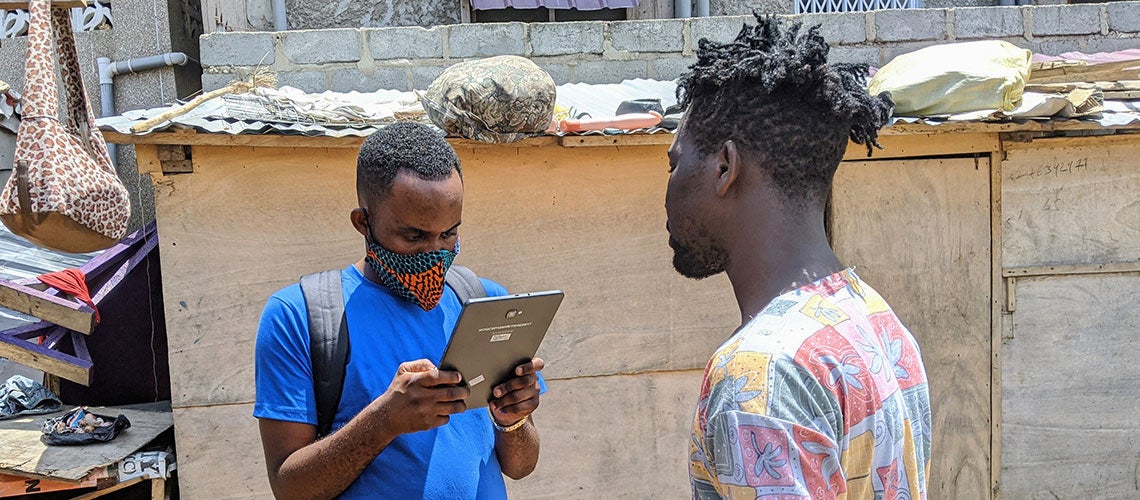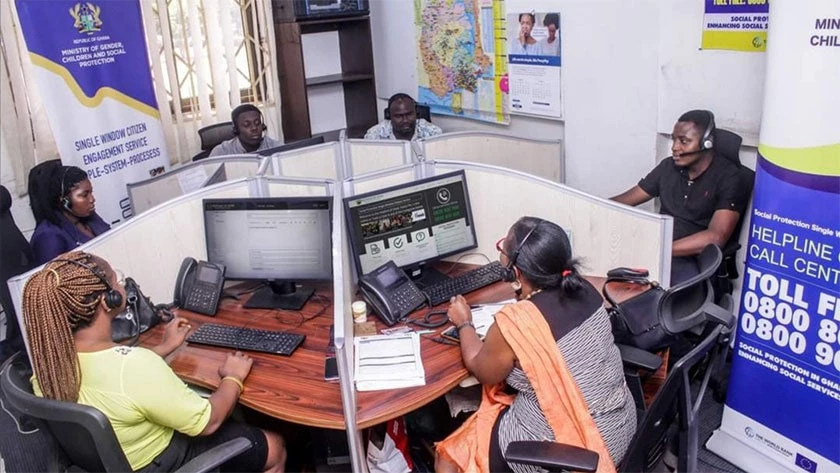 Special Ghana National Household Registry survey in Accra. Photo: Ministry of Gender, Children, and Social Protection of Ghana
Special Ghana National Household Registry survey in Accra. Photo: Ministry of Gender, Children, and Social Protection of Ghana
Strong data systems can play a crucial role in helping governments monitor, manage, and mitigate the impacts of adverse shocks. However, the COVID-19 crisis has exposed serious gaps in the data systems in many countries. As the pandemic continues to evolve and threaten the lives and livelihoods of the most vulnerable, governments around the world are ramping up efforts to collect and utilize timely data about their citizens and policy responses.
Ghana is among the countries pursuing such data initiatives. The government’s social protection authorities augmented and adjusted existing data systems to help inform the design, implementation, and monitoring of the country’s social safety net response to the pandemic.
In this blog, we showcase three specific data sources used by the Ghanaian government: a special high-frequency survey of social safety net program beneficiaries; a special survey of selected poor and vulnerable populations in Accra, Ghana’s largest city; and a citizen engagement and grievance-redress system operated by the social protection authorities. The World Bank and other international organizations provided financial and technical support for the development and utilization of these data sources and systems, in large part through the Ghana Social Opportunities Project which ended in 2018 and the ongoing Ghana Productive Safety Net Project.
Special high-frequency survey of social safety net program beneficiaries
In June 2020, in partnership with the government, the World Bank began administering a special, repeated telephone-based survey to track a sample of beneficiaries of the Livelihood Empowerment Against Poverty (LEAP) program, which offers small, regular cash benefits to poor and vulnerable households across the country. The survey sought to gather information on the evolving effects of the COVID-19 crisis on LEAP beneficiaries and their coping behaviors.
During the first phase of implementation from June through August 2020, the survey was conducted on a weekly basis. The pattern of responses from comparing earlier and later survey rounds suggests that a large share of beneficiary households was adversely affected by the pandemic mainly through income loss (rather than higher prices, or the unavailability of food and other essentials) but that such effects steadily declined.
A second phase of implementation of the repeated beneficiary survey is set to start.
Special survey of selected poor and vulnerable populations in Accra
The government has been building a national social registry since 2015, rolling out fieldwork starting in the north of the country, where poverty and vulnerability levels are highest. Called the Ghana National Household Registry (GNHR), the data gathered in the social registry are increasingly used by the government to help identify poor and vulnerable households for various social safety net programs.
In response to the pandemic, the government redirected GNHR fieldwork to focus on a rapid data collection exercise in Accra in late April 2020 just after a lockdown of the city to control the spread of infection was lifted. Survey personnel sought to interview street and slum dwellers and the destitute poor in selected areas of the city—populations that authorities felt would be worst affected by the lockdown. Fieldwork involved face-to-face interviews due to the need to physically locate respondents, but the survey personnel followed COVID-safe data collection procedures (physical distancing, use of personal protective equipment, disinfection).
The government has used data gathered through this exercise to target emergency housing, food, and other in-kind benefits. The government and international donors are expected to provide additional rounds of relief assistance and plan to use the data to help with targeting.
Citizen engagement and grievance redressal system
Launched in 2017, the Single Window Citizen Engagement Service (SWCES), the citizen engagement and grievance redressal system of the social protection authorities, aims to gather complaints and information related to the implementation of the government’s social safety net programs and social services. Persons can contact SWCES through multiple channels, including a toll-free hotline, with calls being handled by a dedicated call center.

The coronavirus crisis led to a spike in calls and text messages to the hotline. To respond to the greater volume and to ensure COVID-safe operations, the authorities increased the number of call center staff, extended daily operational hours, and provided after-hours voicemail services. The government also provided staff with the means to work remotely and offered special transportation services to those who continued to commute to the call center.
Most of the inquiries to the hotline involved requests for government assistance. The SWCES relayed these requests to relevant units in the social protection agencies. These units processed and addressed the inquiries, in many cases, extending emergency relief benefits to those who were seeking assistance. The authorities have also used SWCES data, along with other sources of data, to map local areas with extensive demand for assistance.
Future promise
Ghana's data initiatives have helped authorities respond more effectively to the COVID-19 crisis. During this process, however, weaknesses in the pre-COVID data systems were revealed. Authorities have begun scrutinizing these systems as a first step towards addressing gaps in data completeness and accuracy. They are also considering how to make these systems more resilient and flexible in the face of possible future waves of the pandemic or other shocks.
At the same time, Ghana's data initiatives have demonstrated the value of more real-time data, as well as the benefits of combining different data sources (triangulation) to achieve a more comprehensive and granular picture of ground realities. These developments are promising as the government invests in the next generation of data systems for social safety net programs.



Join the Conversation